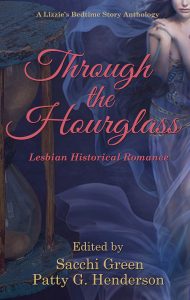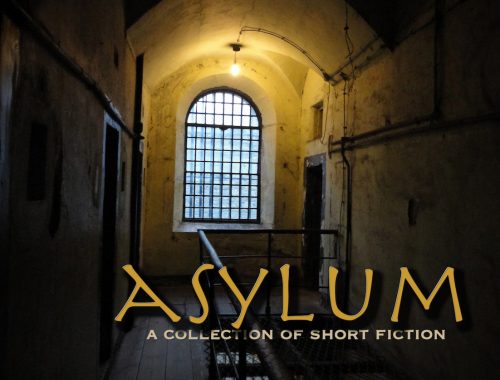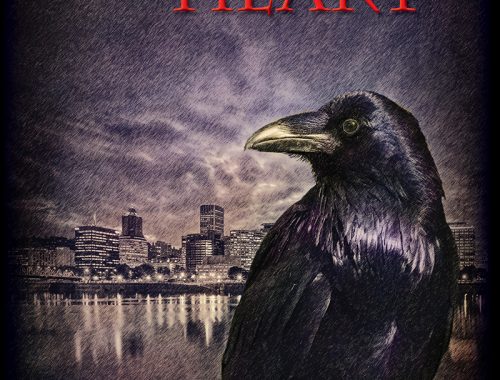I’m continuing my series of catchup posts for Boosting the Signal, to clear my queue so that I can put the feature on soft hiatus while I THEN get caught up on my own work. Since I did three posts yesterday, I’m doing a couple more today to clear the queue, and the first of these is for the anthology Through the Hourglass. Editor Sacchi Green talked to me about how to do a post for this anthology–and the theme, lesbian historical romance, definitely fits in with my interests around here. If the words “lesbian historical romance” sound like reading catnip to you, check this excerpt from Connie Wilkins’ story “The Bridge”, won’t you?

Blurb from the Editor:
Women loving women have been a fact of life for as long as love and women have existed. Who’s to say some of those sculptors of full-bodied stone or ivory goddesses weren’t women? We have always been here, in every era and every area of society, even though our stories have so seldom been told.
Fiction has its own power to deepen and intensify our perceptions and beliefs. Stories that show lesbians in well-researched historical settings, with passions fully recognizable today, rescue our past from invisibility and affirm our place through all time, past, present and future.
The stories here, set from Iceland in the 10th century to New York in the mid 20th, have been written by Ann Bannon, Jean Copeland, R.G. Emanuelle, Allison Fradkin, Patty G. Henderson, Heather Rose Jones, Lee Lynch, Megan McFerren, Cara Patterson, Aliisa Percival, Doreen Perrine, Priscilla Scott Rhoades, Susan Smith, Lexy Wealleans, Connie Wilkins, and MJ Williamz.
A portion of the proceeds for Through the Hourglass will go to these charities that directly serve LGBT senior citizens: Services & Advocacy for GLBT Elders (SAGE) and The Gay & Lesbian Association of Retiring Persons, Inc. (GLARP).
Edited by Sacchi Green and Patty G. Henderson
Published by The Liz McMullen Show Publications
November 2015
——
Upstream the river riffled over stony outcroppings, but under the bridge it ran deep and clear. Reggie leaned over the wooden railing and stared down into those amber-green depths, willing herself to see only a great speckled trout balanced in perfect stillness against the current. An ordinary Midlands English stream, all green shadow and shimmering sunlight and blue reflected sky. An ordinary fish. Yet she could not block out visions of bodies submerged in other streams throughout the ravaged countryside of France, flowing ever redder with blood until they reached the Somme. Even the songs of birds in flight, spilling over with rapture, warped in her mind into cries for help, help that could never be enough.
“Shell-shock,” the doctors might say, but it scarcely mattered what one called it. Pure, searing grief, not war itself—though war would have been enough—had breached her defenses. Grief for Vic. For herself without Vic.
By what right did England bask in such a May morning, calm and lovely, while over there artillery’s thunder still shook the fields, and men rotted in muddy trenches? How could she bear to stand idle in the midst of such peace when her place was over there, even…even with Vic gone? All the more with Vic gone.
But she must adjust, must let the peace of home heal her—not that anywhere felt like home now. Or ever could again, without Vic. If Reggie could prove herself recovered, not only from her physical injuries but those of the spirit—capable once more, clear-minded—they just might send her back to the war. An experienced ambulance driver, strong as most men, skilled at repairing motorcars and field-dressing wounded soldiers; here in pastoral England she was of no use, but over there she was desperately needed.
Reggie straightened abruptly, trying to focus on the tender green of new leaves, the glint of sunlight on the flitting gold and peacock blue of dragonflies. She shook herself like a retriever emerging from deep water.
“Don’t move!” The low, terse command froze her in mid shake. “There’s a nest…” The voice came from below, less peremptory now, but Reggie’s mind raced. A machine gun nest? She fought the impulse to drop to the wooden planks of the bridge. Surely not gunners, not here! A nest of wasps?
“Sorry, I didn’t mean to startle you.” The speaker was almost whispering. “It’s just that swallows are nesting below you on the supports of the bridge, and I’ve been sketching them, but they get uneasy when you move so suddenly and might leave the eggs.”
A flush of fury heated Reggie’s face. Forced to the verge of panic by some silly schoolgirl! She bent over the wooden railing, an angry shout surging into her throat, and saw, first, a head of tousled light brown hair cut short about the ears. A schoolboy, then! All the worse! “WHAT do you bloody mean by—”
The artist looked up. The remainder of Reggie’s words, stifled, burned like mustard gas in her mouth.
Not a boy. Not a child at all, though she might have been taken for one if it weren’t for tiny lines at the corners of mouth and eyes, and a certain look in those eyes that spoke of a share of pain in her life; rather like what Reggie saw in her own when she was careless enough to look in a mirror. Her hair was really no shorter than Vic’s pale curls had been in France, and Reggie’s own dark thatch had been cropped a good deal shorter back then, a necessity in the filth and chaos of battlefields. She realized uneasily that it was about time she cut it again. Eight months in hospital had left it just long enough to tie back in a straggly knot, which she would have hated if she had cared in the least about appearance these days.

Buy the Book: Amazon (Kindle) | Amazon (Paperback) | Barnes and Noble (Paperback) |




